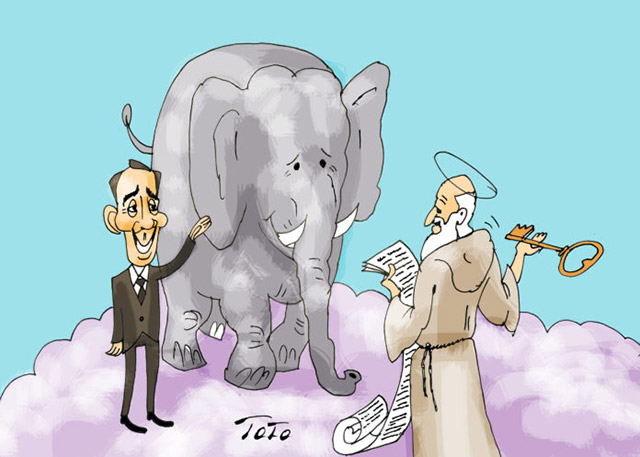by Edmond Y. Azadian
The death of Bob Dole, at age 98, on December 5, was a loss for American politics and a loss for those championing recognition of the Armenian Genocide.
He was a larger-than-life presence on the American political scene, “one of the most durable political figures in the last decades of the last century,” as characterized by Katharine Q. Seelye of the New York Times. He was nominated for vice president in 1976 and for president in 1996, but failed to succeed in either quest. However, his impact was mostly felt in the US Senate where he served for a quarter century and left his personal imprint through strategic leadership and the 12,000 votes he cast on legislation, much of which had historic consequences.
Read also
His personal life and his political career are the epitome of resilience. He was a skillful dealmaker on the Senate floor and, more often than not, was a champion of bipartisanship.
President Joe Biden, an erstwhile opponent on the Senate floor, had this to say upon hearing of his passing: “An American statesman like few in our history. A war hero and among the greatest of the Greatest Generation.”
Growing up in the Dust Bowl of Kansas in a poor family, he empathized with the downtrodden and that empathy became the trademark of his politics when he steered into law the Civil Rights Act of 1964 and the Voting Rights Act of 1965.
It seems, also, that empathy was one of the most significant factors in his espousal of the recognition of the Armenian Genocide. He was sensitized to this issue by a survivor of that genocide, Dr. Hampar Kelikian, who touched his life miraculously and healed his wounds.
The story of their fabled relationship has appeared in many publications and particularly in One Soldier’s Story, written by Dole himself. Dr. Kelikian not only had given a new life to the veteran Dole but offered a philosophical key in the most simple words, which became very characteristic of the late senator: “You have to live with what you have left with, you can’t dwell on what you’ve lost.” With those words he had earned the title of “second father” for Dole, he confessed.
Dr. Kelikian was one of a kind. He had survived the self-defense battle for his native Hajin and later become a down-to-earth yet celebrated surgeon respected globally, all the while wearing his Armenian heart on his sleeve. He had no-nonsense conversations about everything, which probably affected the senator. He was famous for his blunt and pithy remarks as well as sly humor. His ordinary conversation could be characterized as raw wisdom.
Kelikian was even a literary figure, again without much pretense. He made friends after his first encounter with anyone and left an indelible mark through his humor. He never hesitated to call me after midnight to ask a question about Armenian literature or order me to ship a volume of Krikor Zohrab’s short stories by overnight mail. The Chicago Armenian community, where Dr. Kelikian was an icon, remembers many hilarious stories about him.
This brings us to the issue of the role of the individual in history. Dr. Kelikian was a passionate Armenian who told his unvarnished story. Senator Dole, the recipient of that message, was equally sensitive to human misery, and that is how a single person’s story became a political cause in the US senate for many years. There, Senator Dole’s opponent was fellow Republican Sen. Robert Byrd, an unrepentant racist and former Ku Klux Klan leader, beholden to the Turkish lobby.
Robert Byrd was the longest-serving senator in US history and throughout his career, he was a staunch supporter of Turkey, defending that country’s gory history, a public stance which was in keeping with his domestic policy of denigrating African-Americans.
Just as we, Armenians, mourn Senator Dole’s passing now, the Turks similarly mourned Senator Byrd’s death in 2010. At that time, the Turkish Coalition of America released a statement joining “all Americans in mourning the passing of legendary West Virginia Senator Robert Byrd. Senator Byrd was one of Turkey’s most enthusiastic supporters in Congress and a friend to Turkish Americans.”
The statement counts one of the “heroic” acts by Byrd: “Senator Byrd had a long track record of promoting and defending the US-Turkey relationship. In 1990, during an earlier push by Armenian Americans to pass the so-called ‘Armenian Genocide Resolution,’ Senator Byrd worked exhaustively to block the passage of the resolution, eventually leading a successful three-day filibuster which resulted in the defeat of the resolution in the Senate.”
The Turkish government was paying well for this campaign and it accorded accolades and medals to the senator when he visited Turkey. The Turkish government was also part of a smear campaign against Dole. At one point, it went so far as to boycott bananas from the Dole Food Company, believing he had a connection there. (He did not.)
Mr. Dole, in his characteristic dry humor, merely answered, “I don’t have bananas.”
The reason Senator Byrd fought so passionately against the passage of the Genocide resolution seems to have had a personal factor — a “family affair.” Many believe his son-in-law, the Turkish-Iranian Mohammad Fatemi, must have played a role.
On the other hand, another son-in-law, this time Armenian, evidently was not able to help his mother-in-law, US Secretary of State Madeline Albright, act on the Genocide issue. Albright served as US Ambassador to the UN before she was tapped for President Bill Clinton’s cabinet. I had the opportunity to meet her and when I began advocating for recognition of the Armenian Genocide, she stopped me in the middle of the conversation, interjecting, “You cannot teach me more than I know about the Armenian Genocide, because I get an earful from my son-in-law, who is Armenian.”
It is impossible to know how much headway that son-in-law made and how much empathy Mrs. Albright brought to the issue but we know the politics of the time were against the case. She had to follow President Clinton’s line. We all know that when the votes were lined up in the Congress for the passage of the resolution on the Genocide, the Democratic president ordered Republican Speaker of the House Dennis Hastert to block the bill from coming to the floor. The now disgraced Hastert obliged gleefully, as we later found out that he was bankrolled by the Turkish government.
Although individuals cannot always turn the tide, in certain moments in history, when the right person is in the right place at the right time, impactful events of historic consequence can take place, as we see with Senator Dole’s story. On the flip side of the coin, it is lamentable when people face and miss historic opportunities. One such case is that of Steven Zaillian, who won an Academy Award in 1993 for best screenplay for the Steven Spielberg Holocaust film, “Schindler’s List.” The movie touched the hearts of millions around the world, and the subject was certainly one close to the hearts of the Armenians.
Most in the Armenian community had taken it for granted that Mr. Zaillian would take the opportunity and relate the Jewish case to the plight of his own ancestors if and when he had a global audience of two billion. Instead, he accepted the Academy Award with an uneventful, bland speech. By contrast, the documentary filmmaker Michael Moore’s political speech, during the Academy Award’s 2003 ceremony, led to him being booed and dragged off the stage. However, he had the courage to deliver his message no matter what the fallout.
A counterexample was provided by British playwright Harold Pinter, who won the Nobel Prize for literature in 2005. He was too ill to travel but he sent a videotaped speech, where, after some philosophical ruminations, he delivered a scathing message to the world political players. Therefore, it is not uncommon for prize winners to take an opportunity and deliver a political message if they have a chance to address a world audience.
As of this writing, the first Armenian scientist to ever win a Nobel Prize, Dr. Ardem Patapoutian, who won this year for medicine, is on his way to Stockholm to receive his prize. While it would sound too pretentious to give advice to a scientific genius, it is not unfair to expect that he should make some reference to the most epoch-making event in Armenian history in such an august setting, maybe along the lines of wondering how many other Nobel laureates of Armenian descent would have been there had it not been for the mass extermination by the Ottoman rulers.
Incidentally, Dr. Patapoutian’s Nobel Prize came at a most opportune time, when Armenia was defeated in a war and all Armenians were grieving. The Armenian genius had to sprout somehow, somewhere. That was the mysterious revenge of history.
Dr. Kelikian rose to the occasion and made history. Senator Dole took the ball and ran with it, and although in the end he could not deliver during his quarter century in the Senate, his keeping the issue alive led to its eventual success. He lived long enough to see the rewarding culmination of his mission, when the US House of Representatives and the Senate adopted bipartisan resolutions and President Biden put the icing on the cake.
This is a moment to ponder the purposeful life of a great leader, mourn his loss and glorify his enduring legacy.


























































